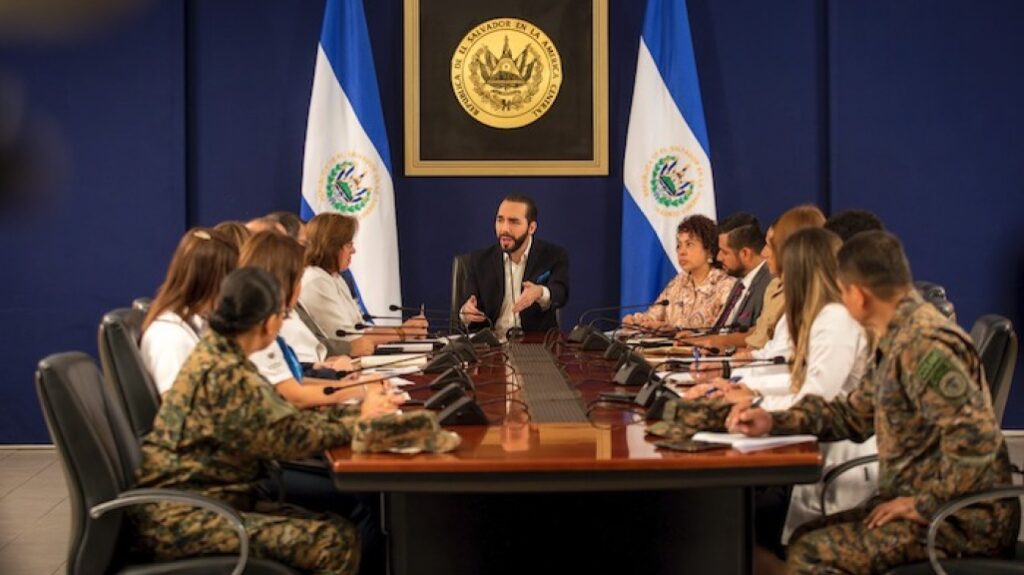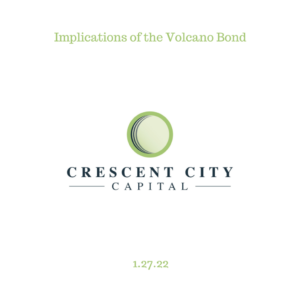Implications of the Volcano Bond
By Chris Kilbourn | Crescent City Capital Market Analyst Intern

Winter arrives in Russia, and a young man’s mind turns to war. Geopolitics are back in the news this week, and it may behoove the crypto space to step back and consider its role in the future of this global game of Risk. And with fears of a looming bear market weighing heavily on everyone’s mind, it may be encouraging to consider some of the fundamental reasons why people – or nations – might still be turning their eyes towards Bitcoin in 2022.
National Adoption
The dip is upon us, and one of the more public figures currently buying it is President Nayib Bukele of El Salvador. Much has been made of his country’s adoption of Bitcoin as a legal tender last year, most of it negative. Experts of all stripes have condemned the choice, with many charging that Bukele has turned participation in a Ponzi scheme into official state policy. Institutions from Moody’s to the IMF have concluded that he has been sold on a lie, and they seem hellbent on swaying him from his course. After all, it can turn heads when people with questionable financial literacy seem convinced they’ve outsmarted the most highly educated economists in the world, and Bukele’s current economic policy can essentially be summarized with the words “up only.”
Bukele is intransigent in the face of such criticism, however, and his flippant treatment of global scrutiny has a distinct undertone of defiance. When Bloomberg criticized his mobile investment antics last month, he doubled down with the revelation that all trades are performed au naturale. His dismissive tone is that of an upstart who operates outside of conventional channels and is thus liberated from answering to their representatives. Indeed, like a Gamestop investor squeezing out hedge funds on Robin Hood, he seems to feel a mixture of triumph and moral vindication born not only from the promise of wealth but also of upending a perceived injustice. And when a man stands so resolute in the face of global criticism – to say nothing of a $20 million trading loss – one has to question whether he has some ulterior motive besides simply getting rich quick. It bears questioning whether there is a larger game he might actually be winning.
The Dollarization of El Salvador
What makes El Salvador’s case interesting is the currency which BTC seeks to replace. It is known as the US Dollar, and it was adopted in 2001. With 16% of El Salvador’s GDP accounted for by foreign remittances sent back from expatriate relatives, a large portion of the nation’s income at the time had to be exchanged for the native colón, artificially overvaluing the country’s currency and driving up interest rates. In an attempt to stimulate growth and further integrate the country with the more dynamic American economy, the dollar was adopted as legal tender in 2001 and essentially replaced the colón over the next three years.
The move had a variety of interesting consequences that form a microcosm of USD’s role in the global economy and the position of outsized prestige enjoyed by America as a result. With the colón essentially out of circulation by 2004, El Salvador’s Central Bank lost any and all capabilities to set monetary policy, as their people were now using another country’s money. Like the Greeks before them, monetary integration actually inhibited growth by preventing them from manipulating their currency to, for example, render their exports less expensive and more attractive to foreign importers. The people of El Salvador were now beholden to a currency whose primary motive was the enrich the country who issued it.
The Current Monetary Order
While few nations have been moved to accept the dollar as a national currency, all operate nonetheless in a power dynamic with the United States that is largely mediated by the dollar’s status as the world’s reserve currency. In a world of political realism in which all states are ultimately competing in a zero-sum game for their own self-interests, this means ceding a degree of relative power to another player. Let’s consider a few of the ways America uses the dollar to assert itself and consider whether there are any new entrants to the game of global monetary competition that could possibly upset this balance of power.
Far, far more than any other currency, global capital markets are denominated in dollars. 60% of the currency reserves held by foreign treasuries are held in dollars, and dollars are involved in 90% of transactions in foreign exchange markets. This means that nations or corporations who wants to borrow or lend money on the world stage are essentially required to do so in USD, which creates tremendous global demand for both dollars and dollar-backed securities.
There are several consequences of this state of affairs. The US Federal Reserve has a disproportionate influence over the world’s financial life. The United States has a greater control over international financial networks, which enables us to sanction and police both state and non-state actors. Nothing, however, compares to the primary benefit of the USD’s dominance on the world stage: when everyone wants your money, everything becomes cheap.
With so much demand for the US dollar, the people, companies, and government who hold it essentially have an upper hand in economic affairs. The people benefit from the purchasing power of a strong dollar and live lives of greater abundance due to the stream of inexpensive foreign imports. American companies have greater access to investment capital through the highly liquid US capital markets, and avoid paying transaction fees since they are able to borrow in their native currency. And the US Government, able to borrow at perennially low interest, employs exorbitant deficit spending to finance its domestic agenda and outsized military. Any way you slice it, American hegemony on the global stage is propped up by the financial primacy of its currency.
Rumblings of Change
So if the world does its lending and borrowing in the debt markets with the greatest amount of liquidity, and one nation is able to finance itself so well by issuing treasury bonds backed by the currency that dominates these markets – what happens when highly liquid capital markets arise that use a different currency altogether? And could any country with treasury holdings in that currency not issue bonds backed by it?
This is precisely the scenario upon which El Salvador staked its future in November, when Bukele announced a $1B bond collateralized by the country’s Bitcoin holdings. While Bukele plans to use the money to build a new city on top of a volcano and use geothermal energy to power his mining operations, the number is conspicuously close to the $1.3B loan they are currently in jeopardy of losing from the IMF for the normal functioning of government. If it succeeds, the implications could be enormous. Not only would Bitcoin emerge as a viable asset that state treasuries could use to back financing for government programs, but doing so would upend the sometimes predatory relationship between third world countries and the creditors with whom they fall into cycles of debt and imposed austerity. And it would essentially distribute the “exorbitant privilege” of reserve currency status amongst all nations with Bitcoin in their treasuries, with power accruing in proportion to their holdings.
This all hinges on the development and adoption of a global system of decentralized finance with enough liquidity to supplant the dollar as the de facto currency of international lending. This is certainly a trend with a long time horizon, but the incentives seem to be there. It only makes sense that other nations would want to lend and borrow in a common currency that is not subject to the machinations of a competitor’s central bank. Countries like Iran, who have run afoul of the United States, will likely be delighted to have access to capital markets after their banks have been shut out of global finance, and have begun putting infrastructure in place to that end. And in general, if a nation can make economic decisions in a way that limits the soft power of a competitor state, it’s often a safe assumption that they will.
At the end of the day, with each country that begins to accumulate Bitcoin as a reserve asset, the size and liquidity of this alternative debt market grows, and crypto thus becomes more attractive to the remaining nations. As all of the existing Bitcoin will be mined within the next 20 years, it can only become an increasingly scarce resource, and thus a closed system in which nations will be forced to compete for influence. Should Bitcoin and its attendant system of decentralized finance establish themselves as the building blocks of an alternative global debt market, the national treasuries of the world will logically embark on an arms race to accumulate as much of it as they can — and with other countries already teasing the adoption of Bitcoin as a legal tender, it may only be a matter of time before more dominos begin to fall.
- https://www.forbes.com/sites/rogerhuang/2021/06/27/an-economic-history-of-el-salvadors-adoption-of-bitcoin/?sh=36a9923e93fd
- http://suffragio.org/2013/11/11/el-salvadors-experience-in-dollarization/
- https://equitablegrowth.org/reserve-currency-privileges-costs/
- https://crsreports.congress.gov/product/pdf/IF/IF11707
- https://www.numbrs.com/bitcoin-and-the-transformation-of-geopolitics/
- https://www.crypto-reporter.com/news/iran-to-approve-crypto-payments-for-international-settlements-23977/

